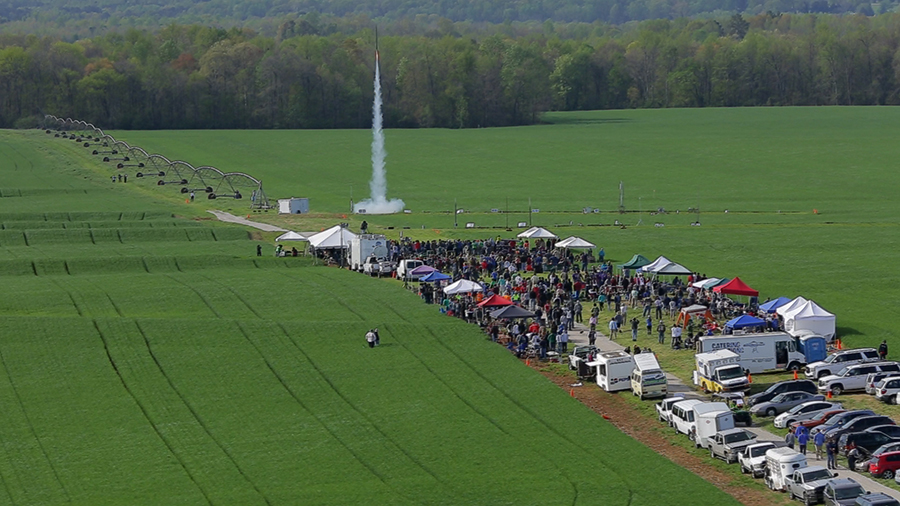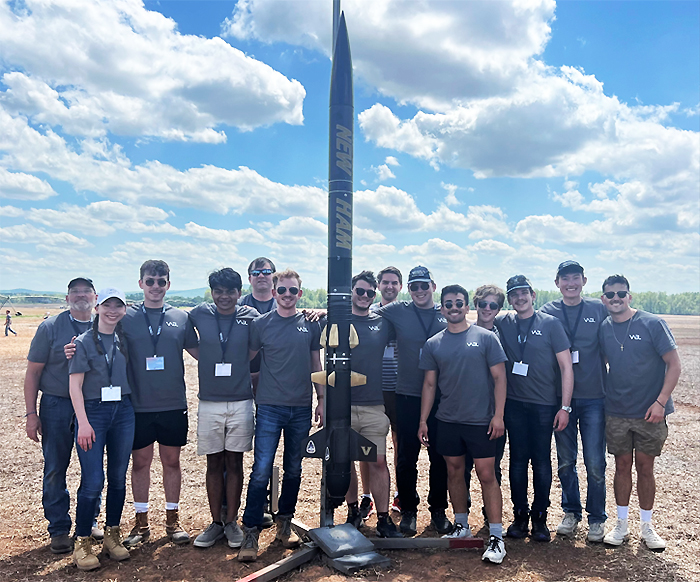
The Vanderbilt University rocket, New Ham, successfully flew to within 4 feet of its 4500-foot altitude target to place first and collect the coveted Altitude Award in the 2023 NASA Student Launch competition. The team also earned a first-place award in the STEM Engagement category and placed second in the key Project Review category.
The NASA launch competition was held April 15 at Bragg Farms in Toney, Alabama. More than 800 students from across the U.S. and Puerto Rico launched high-powered, amateur rockets. The awards ceremony announcing the 2023 results was broadcast June 6 on the Marshall Space Flight Center YouTube channel. The Vanderbilt team ranked third in the overall competition. The University of Alabama, Huntsville, and the University North Carolina at Charlotte were first and second place winners overall.

This is Vanderbilt’s 16th year to participate in the annual NASA event and teams have won the overall championship seven times and the payload design award eight times.
“I am amazed at how year in and year out we are able to assemble extremely ambitious and competitive interdisciplinary teams that are willing to take on the unique challenges of aerospace field engineering and come out successful. This has truly been a longstanding showcase activity for Vanderbilt,” said Mechanical Engineering Professor of the Practice A.V. Anilkumar, Mark Dalton Faculty Director of Experiential Learning and director of the Vanderbilt Aerospace Design Laboratory, sponsor of the Vanderbilt rocket team.
“It always helps to come close to the target altitude, as every minute score matters in this eight-month long evaluation process that involves literally 10 steps,” said VADL design engineer and 2023 mechanical engineering graduate Thomas Dintino, who is joining Lockheed Martin.
“Vanderbilt’s rocket design this year included a sophisticated altitude control fin system. The team was able to hone in on their target altitude, running calculations in real time during their rocket ascent and only missed being dead on by four feet,” said Alotta Taylor, director of NASA’s Strategic Integration & Management Division, who announced the award.
The Vanderbilt rocket, New Ham, is a 53.2 lb. 10ft. long, 6-inch diameter vehicle that flies on a Cesaroni L2375 motor. The rocket’s name honors Ham, at age 3 the first chimpanzee in space, whose flight Jan. 31, 1961, after 18 months of training, lasted approximately 16 minutes. Ham performed his tasks correctly. He lived to the estimated age of 26.
“We were one of the last ones to fly in the manifest on launch day and had to literally wait seven hours in the field before our turn for launching the rocket,’ said James Wedgbury, vehicle engineer and BE’23 in mechanical engineering, who plans to join Boeing.
‘The vehicle had a fantastic flight though and reached an apogee 4 ft from our target altitude and safely delivered the payload upon landing. Post-flight inspections of the vehicle revealed no damage, according to team leader Andrew Noonan, BE’23, who will pursue graduate studies at VADL.
National Association of Rocketry President John Horkheimer presented the STEM Engagement Award. As top winners, the Vanderbilt team will receive a $1,000 prize from the association. Student launch teams reached more than 53,000 students, educators and the public at their engagement events. The award goes to the top team who completes the project requirements through a combination of creative and effective STEM engagement activities and events, quality reports and the number of learners.
“The Vanderbilt team engaged more than 1,400 students, educators and adults in a variety of activities, including a simple yet unique activity about biomimicry and aerodynamics and how engineers get inspiration from nature and reached an extremely diverse group of participants—K-12 school groups, the YMCA and the Nashville Zoo,” said Horkheimer. “Their reports were well written and included activity presentations, handouts, examples of student work and photos from their events.”
The Project Review Award is a key competition category and recognizes the best combination of written reports and milestone review presentation throughout the student launch project year. Vanderbilt took second place behind UNC, Charlotte.
“Vanderbilt’s payload for the 2022-23 mission was a heavily redundant system capable of receiving radio frequency commands to control camera imaging following landing. Various other subsystems, such as a parachute detachment system, leg deployment system, and rotating camera bay supported the mission. A secondary payload designed to control vehicle apogee was integrated into the vehicle,” according to vehicle design team lead Matthew McGowan, BE’23, who is joining Blue Origin as a propulsion engineer.
“All primary payload electromechanical subsystems performed perfectly as anticipated, leading to the successful completion of the payload mission after a software refresh of the cameras through a remote radio communication system’ according to Kush Hari,” a 2023 graduate and double program award winner in electrical engineering and biomedical engineering, who will pursue doctoral studies at the University of California, Berkeley.
Student Launch is one of NASA’s nine Artemis Student Challenges, activities that connect student ingenuity with NASA’s work returning to the Moon under Artemis in preparation for human exploration of Mars. It is an eight-month commitment to design, build, and fly payloads that support Space Launch System (SLS).
Marshall hosts Student Launch with management support provided by NASA’s Office of STEM Engagement, Southeast Region. Funding is provided, in part, by NASA’s Space Operations Mission Directorate and NASA’s Next Gen STEM project. Additional support is provided by Northrup Grumman, National Space Club Huntsville, American Institute of Aeronautics and Astronautics, National Association of Rocketry, Relativity Space, Bastion Technologies, and Siemens Digital Industries Software.
Contact: Brenda Ellis, Vanderbilt School of Engineering Communications